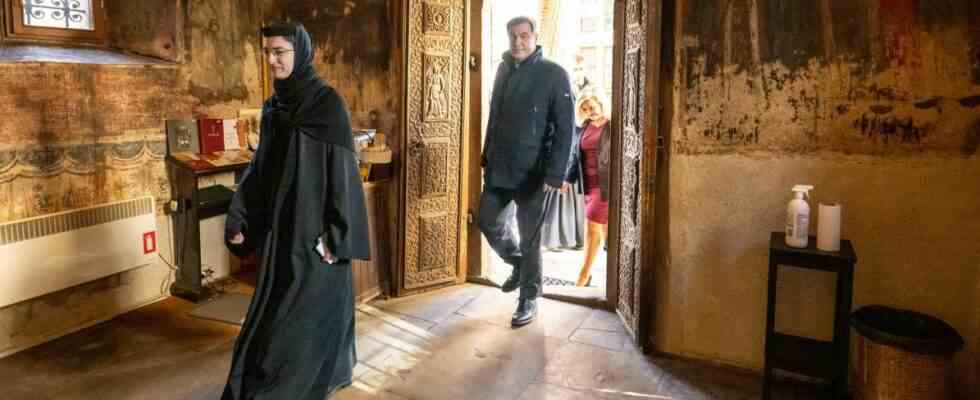Bertram Brossardt from Albania will call on Monday. Normally, the general manager of the Bavarian Business Association (VBW) can often be seen in downtown Munich, often with the Prime Minister. This time Brossardt and Markus Söder (CSU) are meeting far away to deal with a problem at home: the shortage of skilled workers. Among other things, a new office is to be set up in the Albanian capital of Tirana, which will bring local workers together with Bavarian companies more quickly. “A heart project,” says Brossardt on the phone and reports on the talks he just had with local partners. And how are the Bavarian plans received in the Western Balkans? “Positive,” says Brossardt.
Söder is also hoping for something positive from the trip. First Bucharest, Romania. Then Tirana, Albania. These are the stations of the Prime Minister. A lightning trip, there in the morning and back in the evening. So time is of the essence this Monday, and somehow that also applies to the reason for this excursion. The baby boomers, the children of the baby boomers of the 1950s and early 1960s, are gradually retiring. A study by the Chamber of Industry and Commerce (IHK) predicts that by 2035 there will be a shortage of almost 1.3 million workers in Bavaria. This means that if nothing happens, at least every fifth position will be vacant. There is already a lack of staff everywhere.
The prognosis of the VBW is also bleak. It is expected that the number of people in work will fall by 700,000 by 2035. Either way, the Free State is threatened with a turning point, prosperity is at stake, and with it the story of the prosperous state of Bavaria, with which Markus Söder wants to lead his CSU in the state elections this time too. He has to create perspectives in this skilled labor crisis, which is actually a labor crisis. In addition to trained nurses or craftsmen and IT specialists, there is also a lack of assistants in homes, on construction sites and in kitchens. So what to do?
Söder’s strategy is: poach. Only recently did the Prime Minister announce that he intends to recruit teachers from other federal states in order to alleviate the shortage of staff in the schools. Söder is now planning a similar offensive in the Balkans, only internationally. The need is particularly great in the health and care sector. A study commissioned by the Bavarian Ministry of Health calculates that in the worst case scenario, every fifth nurse will be eliminated in Bavaria by 2030 – while the number of older people in need of care will increase due to demographic change. Health Minister Klaus Holetschek (CSU) has been warning of a “humanitarian catastrophe” for months.
However, international competition is fierce, and working conditions are often better elsewhere than in Germany. According to the Federal Employment Agency, it takes an average of more than seven months for a home to find a nurse. An office with Bavarian employees in Tirana should speed up the processes, especially the visa procedures, the goal is a “fast lane”. As the Ministry of Economics reports, there are currently waiting times of up to one year in the Western Balkans. When the federal Skilled Immigration Act came into force in 2020 – which was intended to make it easier to recruit foreign workers – many entrepreneurs complained that their future employees would have to wait a good year for a visa appointment.
However, Eastern Europe also needs qualified workers and creative minds who bring money into the country and keep it there – especially in view of the relatively high unemployment rates in many places. The fact that people often flee to Western Europe to create does not only arouse enthusiasm in the Balkans. How badly there is a lack of hospital staff in Romania, for example, became apparent during the corona pandemic, when numerous additional beds could not be occupied because there were no doctors and nurses. And while Romanian construction workers go to Western Europe, Romania is now bringing in guest workers from the Far East, for example from Nepal. Prime Minister Nicolae Ciucă prefers to omit the subject of skilled workers when he speaks to journalists after the conversation with his Bavarian guest.
Söder sees all this as less of a problem. Since the Bavarian economy not only needs staff, but also has investments to distribute, “it is not a one-sided channel, but a channel that goes forward on both sides. And then it helps both,” says the Prime Minister. So to speak, in return for his poaching maneuvers, Söder is offering his support for the political plans of the two countries he is visiting on Monday: while Romania wants to become part of the Schengen area, Albania wants to become a member of the European Union.
“There is more to do in all areas,” says VBW boss Brossardt about Albanian-Bavarian economic relations. His association envisions the new liaison office in Tirana not only recruiting skilled workers, but also promoting trade with Albania, which has so far been manageable, and strengthening vocational training, for example through cooperation with schools. At best, both sides should benefit from all this, not just Bayern. “There is no other way of working together,” says Brossardt. In any case, the plans for the Bavarian office are well advanced. It should start by July at the latest.

